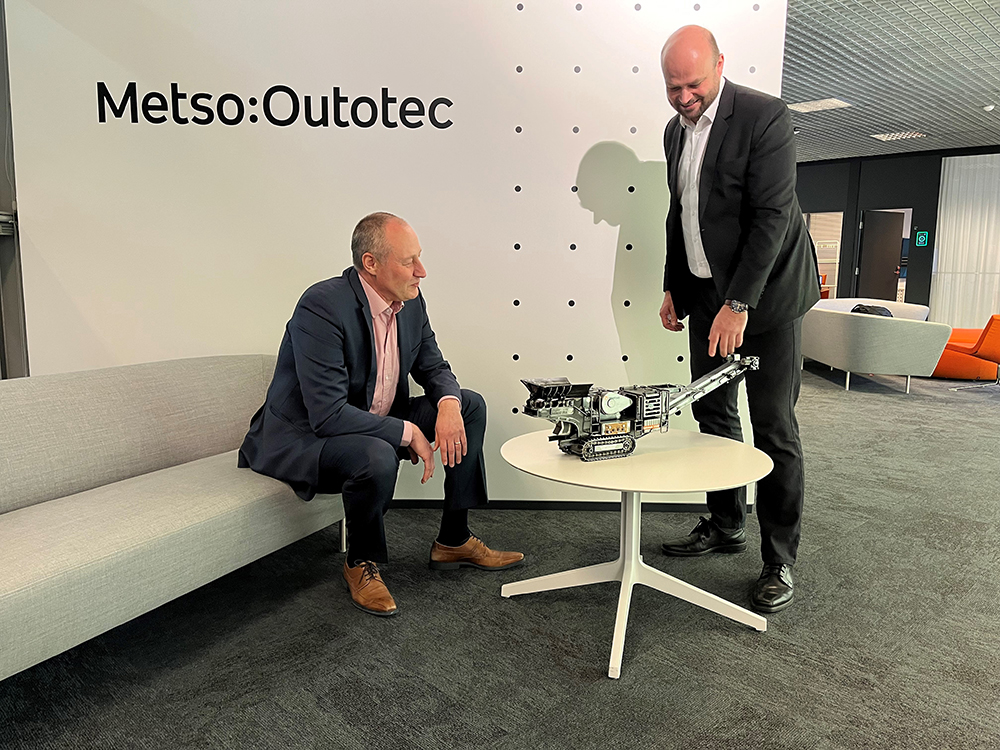
The numbers stack up when it comes to Metso Outotec’s aggregates business. Its eye-catching €1.2bn sales in 2021 came off the back of 12% average annual sales growth since 2016, with the business division representing 27% of the Helsinki, Finland-headquartered quarrying, mining, metals and construction materials processing solutions company’s total annual sales. By far the biggest-selling original equipment manufacturer across its customer industries globally, Metso Outotec has a 36% aggregates business brand market share in North America alone.
Aggregates Business is sitting down with Markku Simula and Sami Takaluoma in November 2022 at Metso Outotec’s HQ as the company prepares for a big 2023 following its highly eventful first two-and-a-half years. Created on 1 July 2020, after Metso’s global Minerals business was combined with Outotec, a Finland-headquartered global provider of process technologies and services for the world’s metals and mining, industrial water treatment, alternative energy, and chemical industries, Metso Outotec’s launch followed Metso’s late-2019-completed acquisition of crushing and screening equipment manufacturer McCloskey International (McCloskey). This included McCloskey’s Lippmann-Milwaukee-branded crushing and screening plants. Metso Outotec increased its aggregates product portfolio further in May 2022 by acquiring Tesab Engineering, a Northern Ireland-based company specialising mostly in mobile crushing equipment for aggregates applications, including quarrying, recycling, asphalt, and concrete
A global business staffed by more than 15,000 employees of more than 80 nationalities, Metso Outotec’s ability to successfully integrate a growing brand portfolio while continuing to grow its sales (Q3 2022 +37% to €1.402bn (€1.023bn in Q3 2021) and 1 Jan-30 Sep 2022 +31% to €3.861bn (€2.958bn 1 Jan-30 Sep 2021) and maintain operating profit (€319mn/8.3% of sales 1 Jan-30 Sep 2022) is even more impressive given how the COVID-19 pandemic, and, since February 2022, Russia’s war in Ukraine have impacted supply chains and other trading norms.
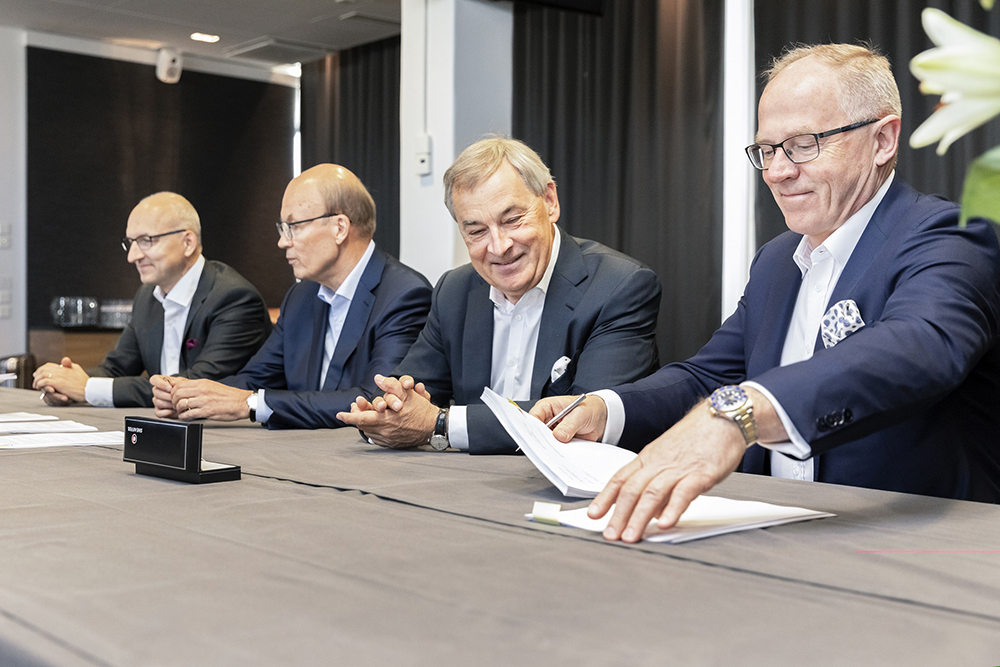
“The pandemic greatly influenced our business, but in some ways positively. The integration of Metso and Outotec to create Metso Outotec went smoother than I would have expected. We were able to reach many people in a short period of time via [Microsoft] Teams. In a day, we could cover the whole world,” says Simula.
“While the pandemic was not good for building personal relationships within new teams, we achieved everything we needed to do in two months during the integration period, rather than what would usually take eight to ten months,” adds Takaluoma.
Simula says Metso Outotec achieved total merger synergies of €142mn by the end of 2021. “That is €22 million more than our €120 million target, and we achieved those synergies far earlier than we anticipated,” he emphasises, adding: “We had two simultaneous integrations really, as our acquisition of McCloskey [International] was completed only a few months before the merger with Outotec.”
Simula says that while acquisitions have helped boost Metso Outotec’s annual aggregates sales revenues, half of the growth has come from expanding the company’s product range and market coverage while also winning market share from competitors. “I think our growth was initially more products driven, and now it is more services driven, growing installed base out in the field and then in servicing those plants. We have a very, very strong services side of our business with a great presence all over the world.
“The market is good in North America right now, so that is good for our aggregates business given our multi-brand presence there.”
Takaluoma believes that McCloskey International customers in North America could benefit greatly from the premium plant-servicing packages available following the company’s 2019 acquisition by Metso Outotec. “The plant-servicing potential was one of several good reasons McCloskey was such a good fit within Metso Outotec. We knew we could leverage enhanced servicing options while allowing McCloskey to continue its strong relationship with customers.”
Globally, Takaluoma says Metso Outotec’s Life Cycle Services (LCS) contracts take-up is growing among aggregates customers, particularly in India. In 2022, Metso Outotec was rewarded with more than 130 new LCS agreements. Aggregates customers make up a third of the around 560 active LCS contracts globally, with mining customers comprising the other two-thirds.
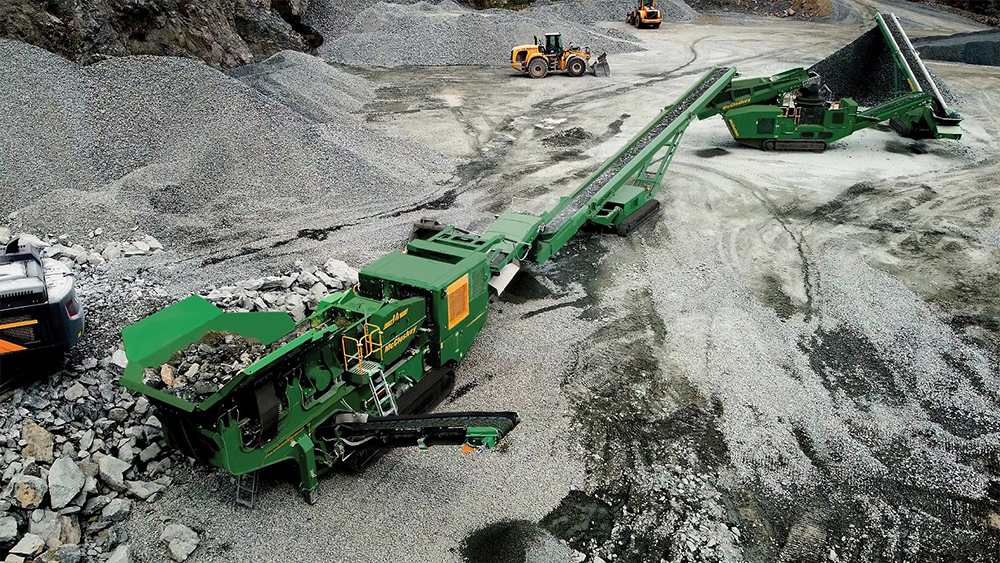
Simula says that Metso Outotec’s aggregates business trading in the European market has been tougher since 24 February 2022, when Russian president Vladimir Putin announced the country’s military operation in Ukraine. Metso Outotec stopped taking orders from Russia in early March 2022 and, in July 2022, announced it would be booking a non-recurring charge of €150mn related to winding down its business in Russia.
“European demand is clearly going down, which is directly linked to the Russia-Ukraine war, inflation and rising energy prices,” explains Simula. “Some of our customers have fixed contracts with their customers and are struggling to make money due to their rising costs. It is not easy for them. Everyone in Europe is concerned about whether an economic downturn is coming and, if it is bad, will it be really bad? This uncertainty impacts our business.”
Takaluoma says that Metso Outotec infrastructure contractor customers in Finland and other parts of Europe have been saying that while COVID recovery money has been spent by national governments and will be coming via the rollout of the €800bn NextGenerationEU coronavirus pandemic recovery fund, it is not stretching as far as pre-pandemic times. “Two years ago, you could build 1,000 kilometres of highway. But now the same amount of money will only give you 700 kilometres. A 1,000-kilometre highway project means you need ten full-time employed contractors, but a 700-kilometre project means you may only need six.
“You could use the same 1,000-kilometre highway example to show the impact of rising inflation on the services side of our business. Four out of ten customers do not place an order for a new processing plant as they don’t see the future as too bright, with the other six placing an order as usual, which includes servicing and wear part support. The four customers not investing in a new plant are planning for a longer shutdown period to avoid the high energy costs. They are also using this time to refurbish or upgrade their existing equipment to be ready for 2023.
“We are seeing increased requests from aggregates and mining customers for retrofitting and upgrading mobile crushers, with part of that tied in with customers and our sustainability goals. For example, some customers want to do the same amount of crushing while using less energy and leaving less waste. It is about us helping customers meet their aims and ambitions rather than something new we need to invent.”
“The upgrading of some of our existing Metso Outotec plants and the wider sustainability agenda is a big part of our global growth strategy,” adds Simula.
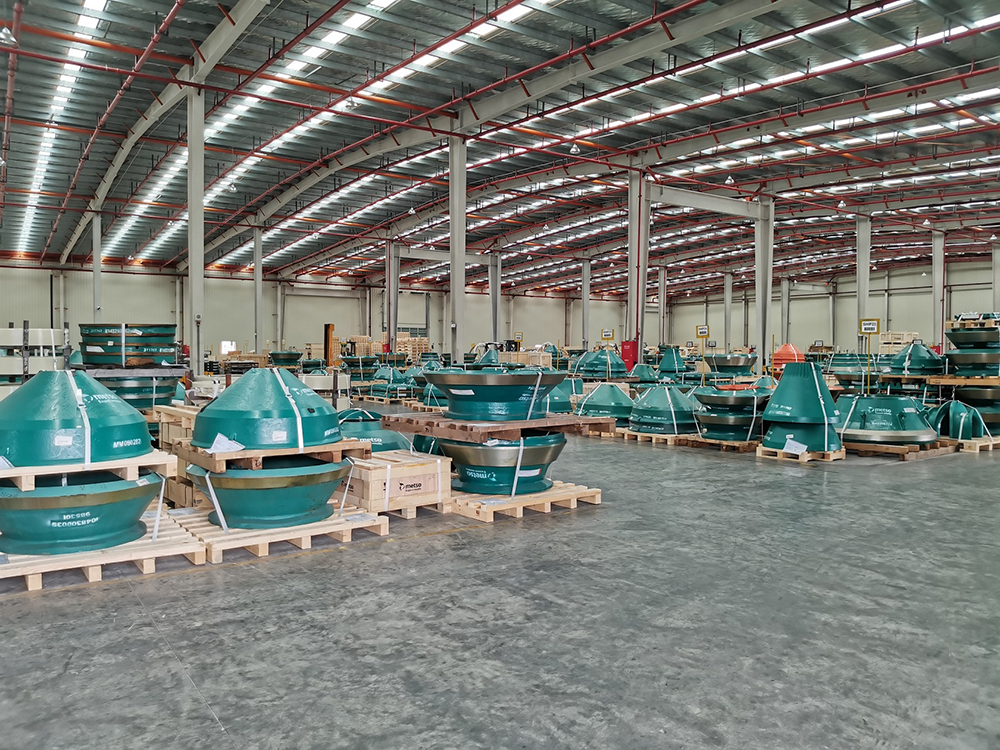
Asked whom Metso Outotec sees as its biggest global aggregates equipment market competitors, Simula replies: “In China, I would say that the Chinese plant manufacturers are tough competition for us. It is the same in India with the Indian manufacturers on their home turf. In the Western World, Terex, especially Powerscreen, are big competitors.”
Simula says that disruption to Metso Outotec’s supply chain due to the pandemic and other factors was “as bad as it could be” towards the end of 2021. “At the same time, demand from our distributors was going sky-high. So, and this is different, I think, from most of our competitors, we would not book the orders until we knew we had the availability of components. Diesel engines were, for instance, very difficult to acquire a year ago. Our distributors were surprised at first but quite soon realised that they could deliver on what they promised.”
Focusing on Metso Outotec’s plant range, Simula says there is a growing demand for diesel-electric hybrid-powered mobile crushers and screeners. “If you look at our plant portfolio, the stationary plants are, by nature, all-electric powered; the wheel-mounted plants are also run by electricity. All our track-mounted machines were diesel-hydraulic years ago, but some are now diesel-electric hybrids. If you look at what research and development we are doing, by far the biggest investment is in diesel-electric hybrid plants. Around 90% of our track-mounted mobile crushers and screeners range are diesel-electric hybrid-power-compatible. We also have some experimental research being done on fully electric plants.”
Widening his plant-portfolio appraisal to include McCloskey International, Lippmann, and Tesab crushers and screeners, Simula continues: “I think we still have gaps regarding certain types of crushers and a certain size of screeners. Some of the other gaps we had have been filled through utilising some plants and technology from our acquired brands, and vice versa for them in being able to draw on Metso Outotec-branded solutions.”
Simula says he has been keenly watching prototype development of hydrogen-powered excavators and articulated haulers for aggregates and construction customers, led by JCB and Volvo Construction Equipment. “If you look at the excavator or wheeled loader side of the [off-highway equipment] market, manufacturers are making tens of thousands a year; we [crusher and screener makers] are making thousands. They have scale to develop hydrogen-powered machines. Once a commercial hydrogen engine solution is available, they can take it and put it in our plants.”
“From an R&D side, everything we do has to have a sustainability improvement aspect to it,” adds Takaluoma, pointing to Metso Outotec’s all-encompassing Planet Positive approach to sustainability. The company is firmly committed to helping limit global warming to 1.5°C, with targets validated by the Science Based Targets initiative (SBTi).
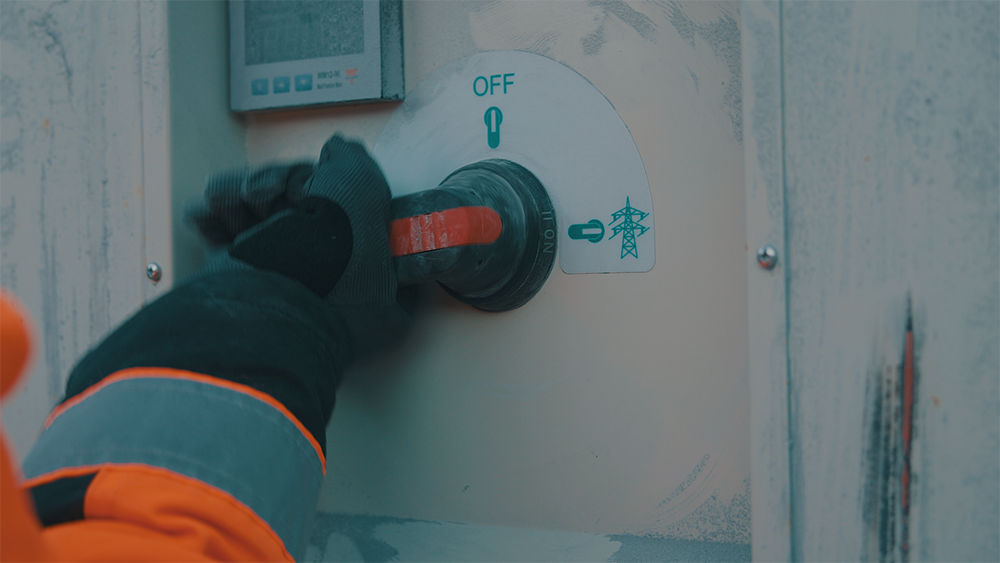
I bring up the topic of materials-processing plant automation and advanced plant data-analytics tools and am eager to hear what customers can expect to benefit from next via Metso Outotec Metrics (Metrics). The company has long highlighted how online digital monitoring can play a key role in every customer business and be a valuable tool for optimising safety standards, maximising operational efficiency, and enhancing profitability. With remote access to your equipment data, the Metrics solution is, says Metso Outotec, like having a production expert alongside you, even though they are hundreds of miles away, providing a proactive way of identifying problems before they cause costly equipment failure, unplanned downtime and productivity losses.
“For us, this is critical. There are thousands of customers using our equipment, and connectivity is part of every new machine that leaves our factory. We have a good solution to remotely support our customers with their troubleshooting, getting their equipment up and running after an event much quicker. It also helps with sustainability, as we do not need someone driving a diesel car to see them,” says Takaluoma. “Digital tools also have big potential around safety, for example, by enabling our crushers and screeners to be controlled remotely from an excavator cab. The next step is improving the end-user experience with our digital tools. Our distributors have a big part to play in helping our customers with that.”
I ask about what role AI (artificial intelligence) is playing in Metso Outotec’s plant automation and digital plant analytics tools development. “We are working with a particular Finnish company and universities worldwide as part of our AI journey. It is initially being used to help us serve our customers better from a supply chain visibility point of view.
“We want to get to the stage where customers get almost minute-by-minute updates of where a machine or replacement part is, considering the weather and other factors,” highlights Takaluoma.
Simula says Metso Outotec is expanding its manufacturing and assembly capabilities at its state-of-the-art site in Alwar, Rajasthan, north India. In November 2021, the company announced plans to grow its Alwar production value by 30% from its current level and global track-mounted mobile machine capacity by 15%.
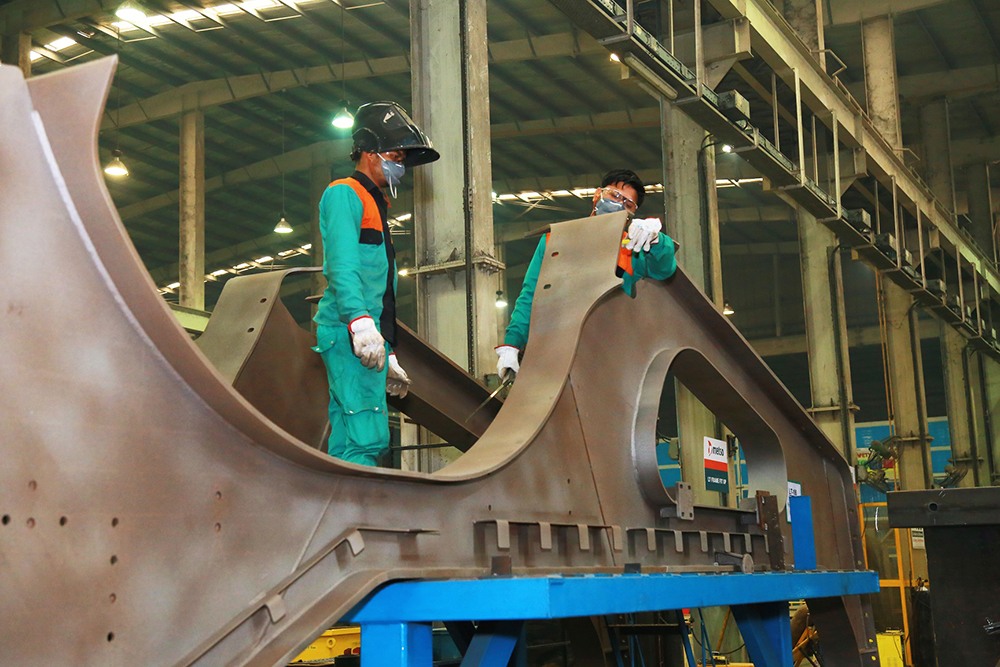
The increased capacity in India will be used for the manufacturing of McCloskey, Tesab mobile and Lokotrack equipment, creating around 200 new jobs. After the extension is completed in Q1 2023, the Alwar factory will be one of Metso Outotec’s biggest manufacturing sites globally, employing about 800 people. Most of the machines manufactured and assembled in Alwar are shipped to customers in Southeast Asia and Africa.
“In each of the past three years, we have also doubled our engineering personnel in Alwar. We will be looking to increase our numbers again in 2023,” stresses Simula. “The commercial potential for us in the Indian aggregates market is huge given the way the country’s infrastructure is being developed.”
“What is very interesting already for us is that we have more than 100 Indian aggregates customers with Life Cycle Services contracts,” says Takaluoma. “They truly see the value of being more connected to OEMs [original equipment manufacturers] with their plant maintenance, wear parts replacement and wider services provision.”
“Our LCS contracts are also helping our Indian customers with their sustainability targets and creating more of a circular economy,” adds Simula, showing me a presentation slide illustrating how Metso Outotec electric NW plants used by small- to medium-sized quarry and contractor customers in India are lowering their operational costs while enabling the use of renewable energy. Another slide highlights how the company’s wears return programme within Indian LCS customer contracts is lowering customer CO2 emissions by 58%, air pollution by 86%, water use by 40%, and water pollution by 76%.
I steer the conversation to Metso Outotec’s worldwide distributor network and its effectiveness at retaining existing and gaining new aggregates customers. “We have more than 250 dealer distributors globally and have been developing several networks: a global one for Metso Outotec, a McCloskey International network which is almost global, and Lippmann, which has a multi-regional distributor network,” explains Simula. “We have also revamped Tesab’s distributor network, having identified during the acquisition who we thought would be good new professional distributors for their machines. We are continuously developing our distributor networks across our brands. We have an excellent name within our industry, and people come to us looking to form dealer-distributor partnerships. Our global distributor networks are a key part of our success. I value them very highly.”
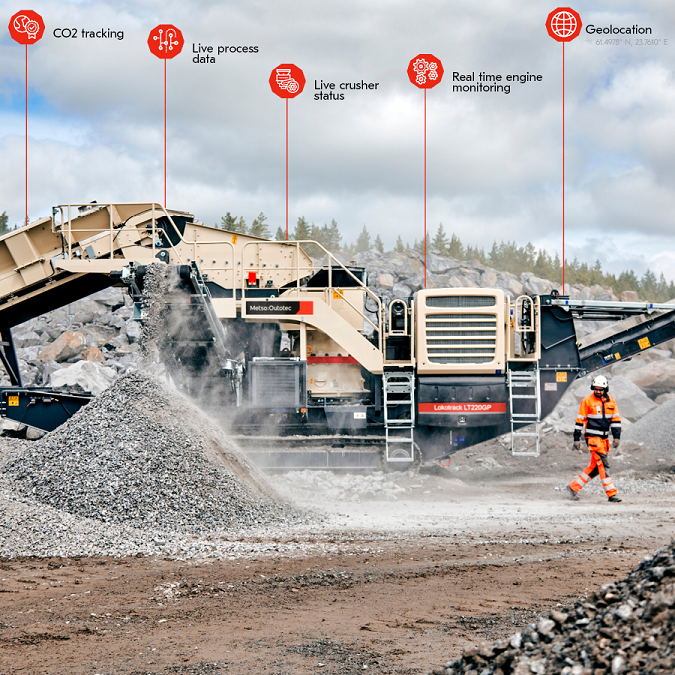
I end what has been an enjoyable 90-minute conversation asking Simula and Takaluoma how the world’s 45-billion-tonnes-a-year demand for aggregates will be met by producers a decade from now. “There will remain a great need for crushed stone aggregate, but there will be more digitalised, automated, and AI-inclusive production, requiring fewer people on-site,” notes Takaluoma.
“At those future aggregates-processing sites, there will not be too many diesel-powered plants. There will be a lot of hydrogen, electric and other alternative-fuel-powered machines,” Simula predicts. “I don’t think there will be a power monopoly; customers will choose from many suppliers. There will be more and more solar panels and wind turbines around us, and better-connected electric grids featuring more and heavier cables.”
Takaluoma concludes: “It might be in ten years’ time that some quarrying companies have their own mini nuclear plants or other low-emission-power-supply factories nearby. Wireless electricity supply is already being tested on roads and may become an option for aggregates producers.”








